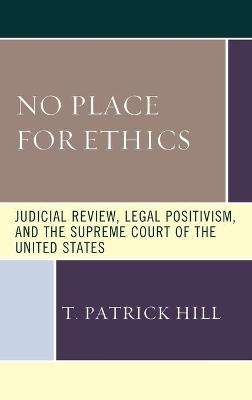
No Place for Ethics
Fairleigh Dickinson University Press (Verlag)
978-1-68393-323-6 (ISBN)
In No Place for Ethics, Hill argues that contemporary judicial review by the Supreme Court rests on its mistaken positivist understanding of law—law simply because so ordered—as something separate from ethics. To assert any relation between the two is to contaminate both, either by turning law into an arm of ethics, or making ethics an expression of law.
To address this mistake, Hill contends that an understanding of natural law theory provides the basis for a constitutive relation between ethics and law without confusing their distinct role in answering the basic question, how should I behave in society?
To secure that relation, the Court has an overriding responsibility when carrying out its review to do so with reference to normative ethics from which the US Constitution is derived and to which it is accountable. While the Constitution confirms, for example, the liberty interests of individuals, it does not originate those interests which have their origin in human rights that long preceded it.
Essential to this argument is an appreciation of ethics as objective and normatively based on principles, like that of justice and truth that ought to inform human behavior at its very springs. Applied in an analysis of five major Supreme Court cases, this appreciation of ethics reveals how wrongly decided these cases are.
T. Patrick Hill is associate professor at the Edward J. Bloustein School of Planning and Public Policy at Rutgers University.
Introduction: Ethics and Law, A Complicated but Necessary Relationship
OneLochner v. New York, 198 US 45 (1905): Public Health and. the Constitutionally Protected Right of Contract between an Employer and Employees
TwoDeShaney v. Winnebago County Department of Social Services, 489 U.S. 189 (1989): Liberty and the Due Process Clause of the Fourteenth Amendment
ThreeNew York v. United States, 505 U.S. 144 (1992): Wither the Social Contract?
FourFDA v. Brown & Williamson Tobacco Corporation, 529 U.S 98 (2000): FDA Uses the Food, Drug, and Cosmetics Act (FDCA) of 1938 to Claim Regulatory Authority Over Tobacco Products
FiveUnited States v. Morrison, 529 U.S. 598 (2000): Legal Formalism versus Human Rights, Federal Civil Remedies and the Victims of Gender-Motivated Violence
| Erscheinungsdatum | 05.07.2021 |
|---|---|
| Reihe/Serie | The Fairleigh Dickinson University Press Series in Law, Culture, and the Humanities |
| Verlagsort | Cranbury |
| Sprache | englisch |
| Maße | 159 x 229 mm |
| Gewicht | 585 g |
| Themenwelt | Geisteswissenschaften ► Philosophie ► Ethik |
| Recht / Steuern ► Allgemeines / Lexika | |
| Recht / Steuern ► EU / Internationales Recht | |
| ISBN-10 | 1-68393-323-0 / 1683933230 |
| ISBN-13 | 978-1-68393-323-6 / 9781683933236 |
| Zustand | Neuware |
| Haben Sie eine Frage zum Produkt? |
aus dem Bereich


